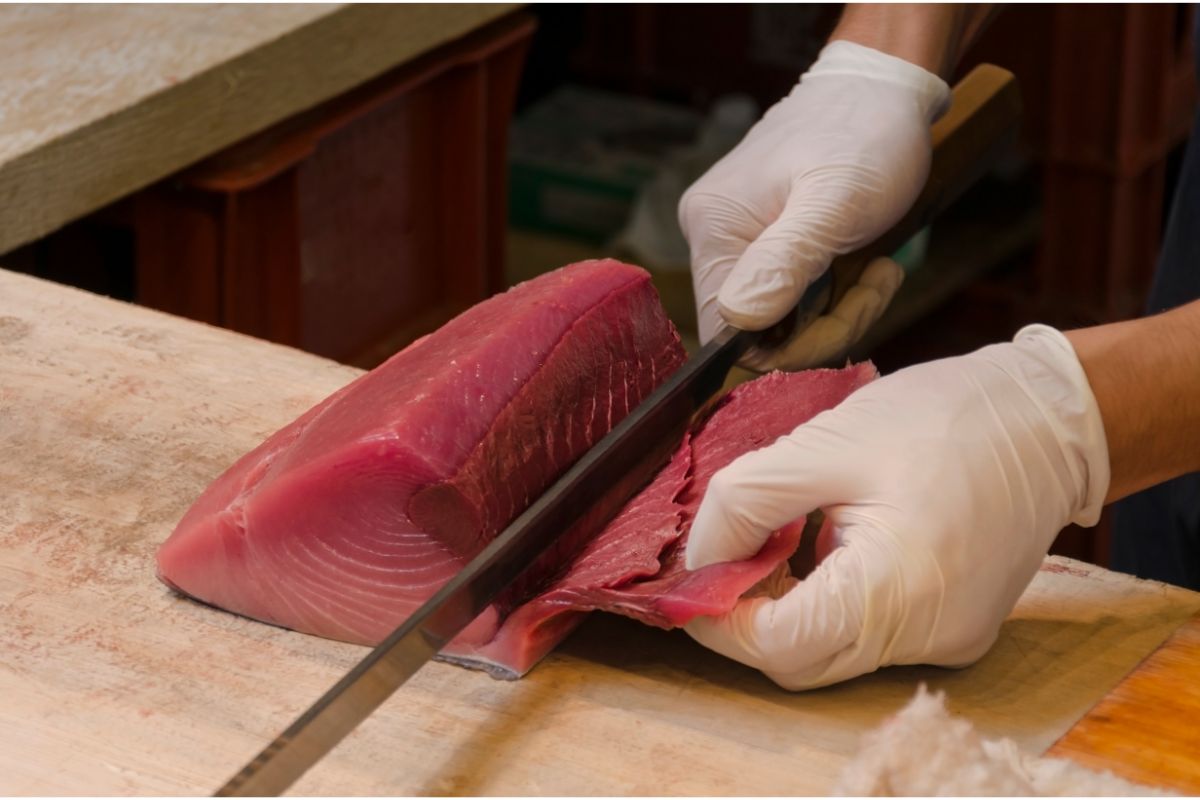Are you unsure how long tuna can sit out unrefrigerated? Maybe you left tuna out and want to know if you can eat it?
Or are you curious about storing tuna and want to know more? No matter the question that brought you here, we have the answers for you!

Finding out how long tuna can sit out unrefrigerated can be tricky, especially if you have not stored leftover tuna before.
You head online for answers but are met with pages and pages of conflicting and contradicting information.
How do you know who to believe? Frustrated and overwhelmed, you wonder if you will ever find the answers you need.
Well, no more! Today, we are here to tell you how long tuna can sit out unrefrigerated. In our complete guide, we also explore how to correctly store tuna and what can happen if you eat bad tuna.
Keep reading to become a tuna expert today!
How Long Can Tuna Sit Out Unrefrigerated?
Let’s dive straight into today’s article! Fresh or canned tuna should not be left unrefrigerated for more than two hours. If the tuna has been left sitting in the sun, it should not be left unrefrigerated for more than one hour.
This is because of the risk of dangerous bacteria growing on the tuna that can cause possible food poisoning.
You need to be extra careful when it comes to tuna to prevent making yourself or others sick.
But providing that you store your tuna properly, it can be refrigerated for up to three days, allowing you to enjoy your leftovers or prepare other meals.
How Long Can Raw Tuna Be Out At Room Temperature?
Cooked or canned tuna can be left at room temperature for a few hours. However, raw tuna should spend no more than one hour outside of the refrigerator.
The FAQ advises that any tuna left outside the refrigerator for longer than one hour should be thrown away and not eaten.
What Happens To Tuns If It’s Left Out For Too Long?
If tuna is left out for too long, it can cause food poisoning. It is best to dispose of any tuna that has been left unrefrigerated for too long, you don’t want to make yourself sick!
If your tuna is left out in temperatures between 40 and 140 degrees Fahrenheit, dangerous bacteria can start to grow.
This can lead to food poisoning and possible hospitalization. It is best to be cautious and throw out any tuna that has been left out for too long!
How To Tell If Tuna Is Spoiled
There are a few easy ways to tell if tuna has spoiled. The easiest way is to smell your tuna. If the tuna has a foul smell, it is likely to have gone bad. This tuna should be disposed of immediately.
If your tuna is frozen, allow it to thaw before you smell it. Frozen tuna will not give off an odor, even if it has gone bad! Thaw it in your refrigerator and then smell it before deciding if it is suitable to eat or not.

How To Store Tuna
The best way to get the most out of your tuna is to store it correctly. The leftover tuna can be stored in your refrigerator for up to three days, great for sandwiches or meal prepping.
Check out our top tips for storing your tuna now!
- Keep your tuna in an airtight container
- Keep it in your refrigerator with temperatures between 35 to 38 degrees Fahrenheit
- Your tuna should be placed on a shelf in the refrigerator and not the door. The door of your refrigerator is prone to unstable temperatures and will not keep your tuna safe to eat.
How Long Before Tuna Goes Bad In The Refrigerator?
If you store your tuna correctly in an airtight container, it will last for three days in the refrigerator. Make sure before you eat tuna that you smell it and check for mold.
Leftover tuna usually lasts for three days in the refrigerator before going bad.
Final Thoughts
And there you have it! Tuna can sit out unrefrigerated for one hour in the sun, and two hours out of the sun. Any longer and your tuna needs to be disposed of to prevent it from giving you food poisoning.
But by taking the time to store your tuna correctly, you can enjoy it for up to three days! Don’t forget to follow our steps to correctly store your tuna!
Frequently Asked Questions
Be sure to check out our FAQ section before you leave us today!
Although tuna is a great source of omega-3 fatty acids and protein, it should not be eaten every day. Tuna have higher levels of mercury due to their feeding tendencies.
You should only eat tuna a few times a week to avoid consuming too much mercury.
Low levels of mercury are harmless to your body, but you don’t want to eat too much as it can make you unwell.
You should avoid buying albacore tuna where possible, as it can have higher mercury content. Instead, opt for skipjack which has lower mercury levels.
Consuming old tuna can cause food poisoning or salmonella. If you eat old tuna, be sure to seek medical treatment straight away!
There can be severe consequences to food poisoning, so it’s best to be safe and avoid eating any tuna that you think is old.
Tuna spoils quickly as it is a fresh and highly perishable food.
Like other seafood, tuna has a high water and nutritional content that can create conditions for bacteria to grow quickly, causing tuna to spoil.
- How To Reheat A Cheesesteak - November 5, 2023
- What Are Three Must Have Kitchen Knives? - September 22, 2023
- How To Protect Edges Of Pie Crust - June 15, 2023








